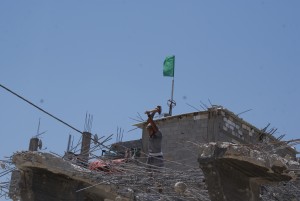A carrot and stick for peace in the Middle East
Given the fragile situation in Lebanon, the pledge by EU member states to provide troops to police the UN-backed ceasefire was well-timed. However, to avoid a fresh crisis from erupting, Europe will have to aid efforts to forge lasting peace in the Middle East.
European foreign ministers agreed, on Friday 25 August, to contribute around 7,000 troops to a 15,000-strong expanded UN peace contingent, which, along with the redeployed Lebanese army, is charged with providing a buffer zone between Israel and Hizbullah in southern Lebanon.
“Europe is providing the backbone to the force…We can now begin to put together a credible force,” UN Secretary-General Kofi Annan said after the emergency meeting in Brussels.
France – which with the United States co-authored the shaky ceasefire deal – was widely expected to lead the UN force. It drew surprise and criticism when, immediately after the truce took effect on 14 August, it only sent 50 engineers as a token gesture.
It was only after Italy offered to lead the UN mission that France announced it would contribute 2,000 soldiers. Italy has committed 3,000 troops and will take over the lead after France. Belgium, Poland and Finland have also offered soldiers.
But if deployments take months, as some member states suggested, then renewed strain could possibly re-ignite the conflict, which caused the death of about 1,200 Lebanese, mainly civilians, and 157 Israelis, mainly soldiers.
Throughout the 34-day conflict, the EU was criticised for its slow and indecisive response. “I don't think the EU's credibility – in terms of popular perceptions of its role in the Middle East – has emerged unscathed,” said Mouin Rabbani of the respected International Crisis Group, a Brussels-based think tank.
In fact, political paralysis in recent years has seen the Union fail to use its massive reserves of ‘soft power' to steer the parties to the conflict to commit to the so-called ‘roadmap' to peace it helped author. The EU's consistently indecisive response to previous crises – such as Israel's ongoing closure of Gaza or its reinvasion of the Palestinian territories in 2002 – has dented its credibility in the region.
In addition, the Barcelona Process, launched in 1995 to create an extended area of peace and prosperity in the Mediterranean, lies in tatters. “The EU is not only internally divided but more importantly seems unable to implement Middle East policies that are independent of the United States,” Rabbani notes.
With the notable exception of the UK, Germany, the Netherlands, Poland and the Czech Republic, a clear transatlantic rift occurred, with the United States openly backing Israel's declared objective of breaking the back of Hizbullah as a fighting force, while most of the EU was in favour of an immediate ceasefire.
The main barriers to Europe navigating an independent course to Washington's are the UK and Germany. London has its ‘special relationship' with the United States and its own involvement in a bloody Middle Eastern conflict. Berlin is keen to repair the damage done to its relationship with Washington prior to the invasion of Iraq and, for historical reasons, is reluctant to criticise Israel.
The EU is the major trading partner of just about every country in the Middle East but this internal division has caused it to punch below its collective economic and political weight.
As part of Barcelona, the Union has Euro-Med association agreements with every one of the frontline states in the Arab-Israeli conflict, except for Syria. Israel's 2000 accord provides it with tax exemptions for its products in EU markets. In 2004, the total volume of bilateral trade (excluding diamonds) came to over €15 billion, making up a third of Israel's exports and almost 40% of its imports.
Although each association agreement contains human rights stipulations, the EU almost never invokes them, despite occasional pressure from the European Parliament and human rights activists. Under the European Neighbourhood Policy, Israel's three-year action plan contains commitments on political dialogue and co-operation, including on the defunct Middle East peace process.
Rabbani suggests that: “The Union [should] try to steer the UN and the international community as a whole towards a more sustainable process.”
Ideally, the EU should learn that a common foreign policy on certain critical issues, such as the Middle East, is in everyone's interest. One promising example of the way forward is the Union's handling of the nuclear debacle with Iran which, despite challenges, has stopped a crisis turning into a catastrophe.
“Europe was insufficiently active in the Lebanese crisis, although France had recommended on a number of occasions that the high representative [Javier Solana] be given a mandate to speak out on behalf of the 25 member countries, as he is doing on the Iranian issue,” French President Jacques Chirac told French diplomats in Paris on Monday 28 August.
The Union should take this idea even further and revive the dormant notion of a comprehensive Arab-Israeli settlement. It should agree a common policy with teeth that offers all the frontline states – Israel, Palestine, Lebanon, Syria and Jordan – carrots and sticks to motivate them to navigate the path to peace.
In order to ensure that the majority of Europeans are behind this common approach, member states should open the process up to public consultation.
The EU's foreign policy chief Javier Solana should then receive a mandate and the commensurate power to go out and work towards this.
The Union should complement this traditional top-down approach with grassroots efforts to build understanding between Arabs and Israelis, particularly at a time when the chasm of popular opinion seems to be widening.
Through its existing conflict prevention and resolution measures, Europe could back efforts by Arab and Israeli peace activists to forge a cross-border civil alliance aimed at creating the groundswell of understanding upon which any sustainable peace must be founded.
_______
This article appeared in the 31 August edition of The European Voice.


